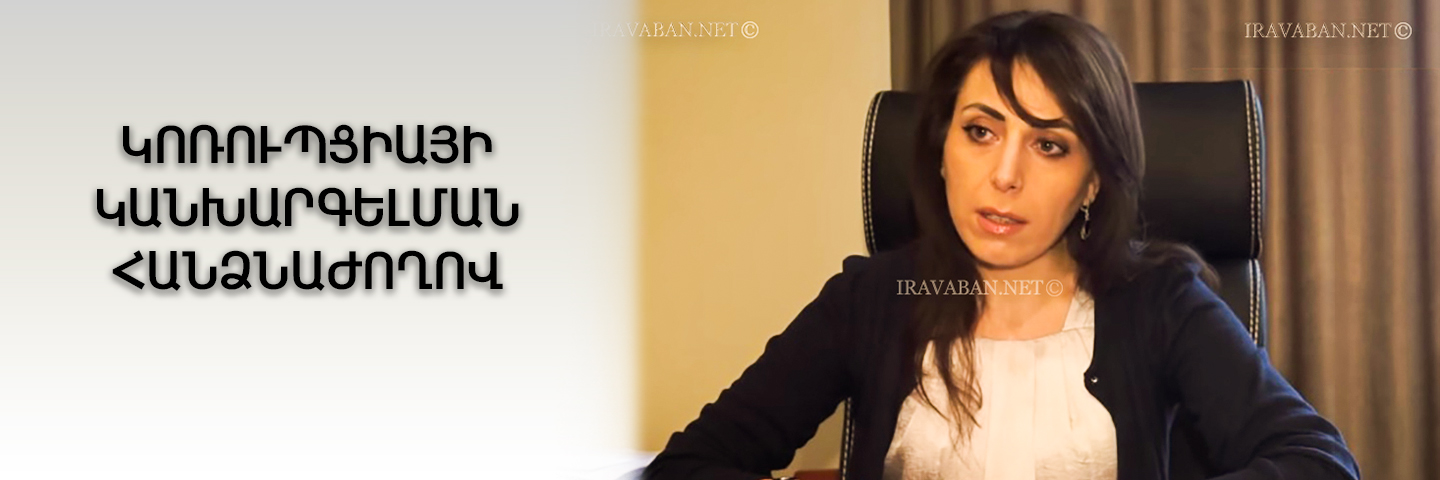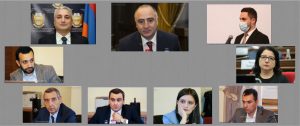The issue of election of the members of Corruption Prevention Committee was discussed at the National Assembly on 18 November.
The voting for on the election of the 5 members of the Corruption Prevention Committee was held at the National Assembly on 19 November (102 deputies participated). The candidates were:
- Government – Lilit Alexanyan(for 85, against 15, invalid 2),
- NA “My Step” Faction – Edgar Shatiryan(for 96, against 6),
- NA “Prosperous Armenia” faction – Narek Hambardzumyan(for: 71, against: 31),
- NA “Bright Armenia” Faction – Haykuhi Harutyunyan(for 90, against 12),
- Supreme Judicial Council – Aramayis Pashinyan(for 85, against 16, invalid 1).
Further, on 26 November, the Corruption Prevention Committee discussed the issue of electing the Chair of the Committee. Haykuhi Harutyunyan, the representative of the NA “Bright Armenia” faction, and Edgar Shatiryan, the NA “My Step” faction, nominated themselves for the post of the CEC Chair.
According to the Law on the Corruption Prevention Committee, the members of the committee decided to elect Haykuhi Harutyunyan as a result of the vote.
Let’s have a look at Haykuhi Harutyunyan’s activities.
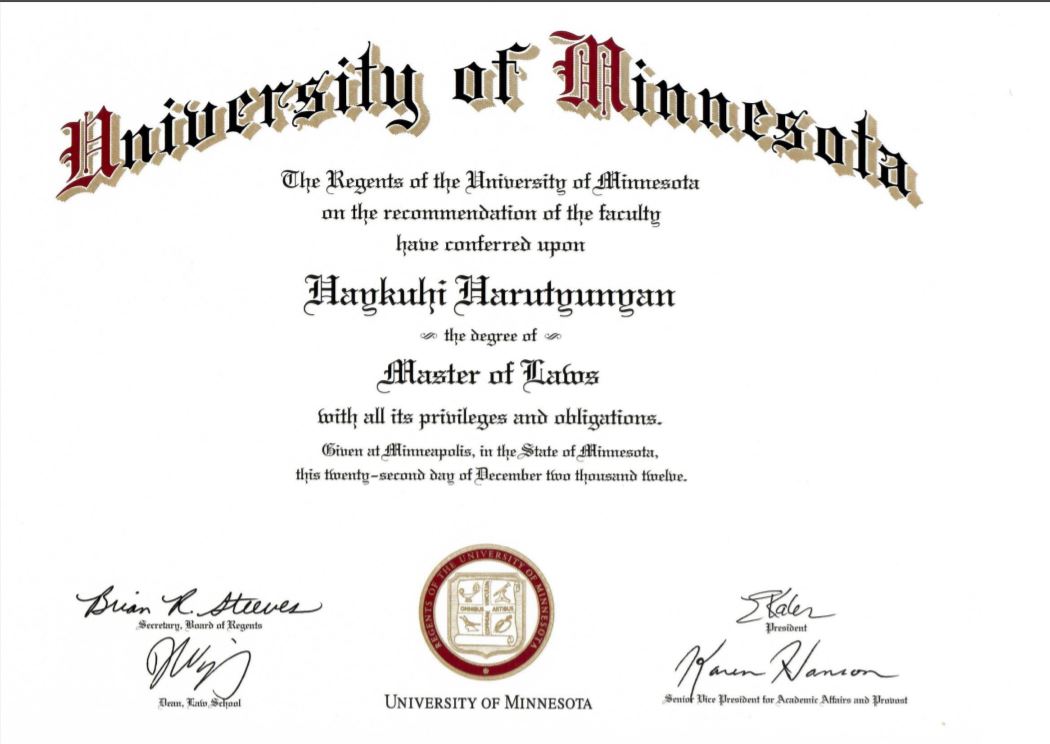
ՀHaykuhi Harutyunyan is from Vanadzor; Studied at Vanadzor Secondary School # 1, then at Vanadzor State Pedagogical Institute (specialization in History and Law), later in 2004-06, in Mkhitar Gosh Armenian-Russian International University (specialization in Law), further at the University of Minnesota, USA and received a Master’s Degree in Leadership, Human Rights and Rule of Law (December 22, 2012).
“Bright Armenia” Party, natives of Vanadzor and Haykuhi Harutyunyan
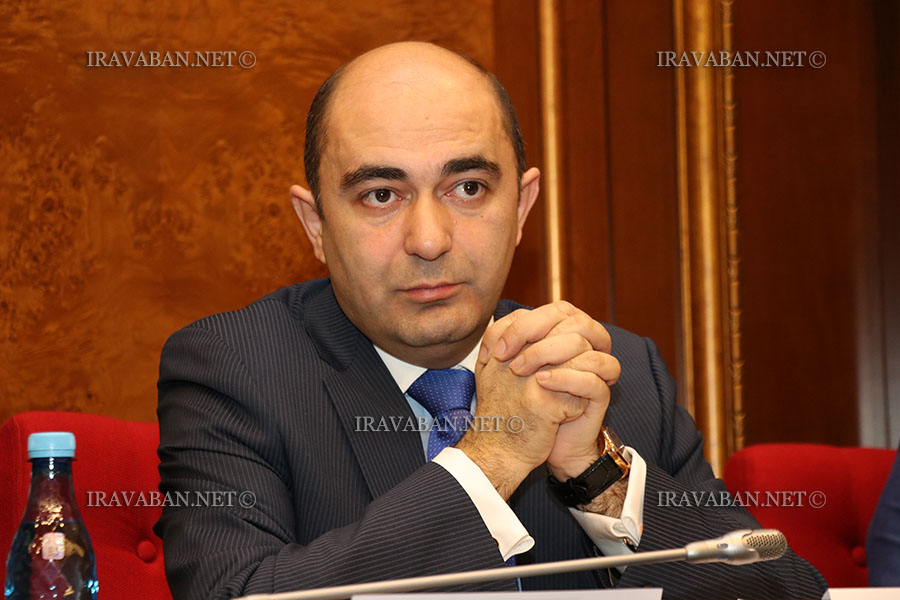
Edmon Marukyan, was born in Vanadzor; he is also a member of the National Assembly, the party party led by Marukyan, nominated Harutyunyan as a member of the CPC. Interestingly, Edmon Marukyan graduated from the University of Minnesota Law School in 2010 a Master’s Degree in Human Rights and International Law. Marukyan also taught law in Vanadzor from 2007-2008, at the Chair of Philosophy and Political Science of Tumanyan State Pedagogical Institute, where Haykuhi Harutyunyan studied.
It should also be noted that Haykuhi Harutyunyan and Edmon Marukyan’s wife, Tatevik Matinyan, were granted a lawyer’s license on the same day, 16 October, 2010.
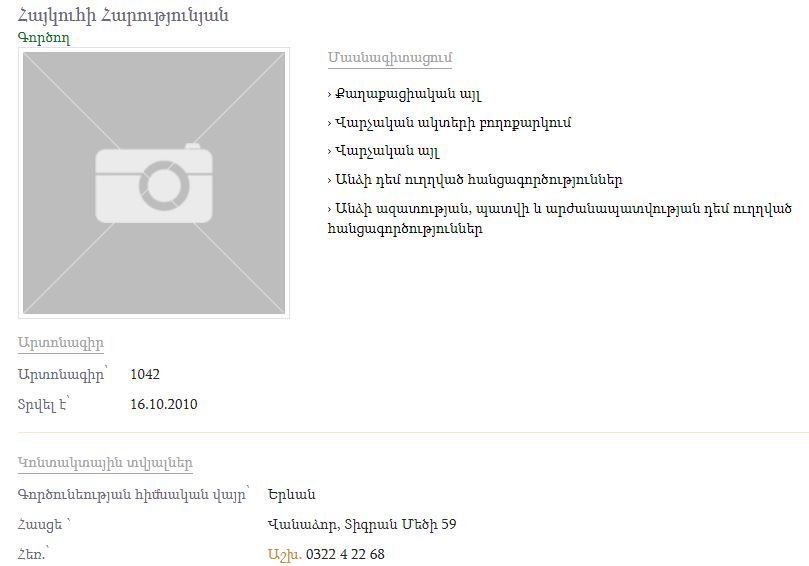
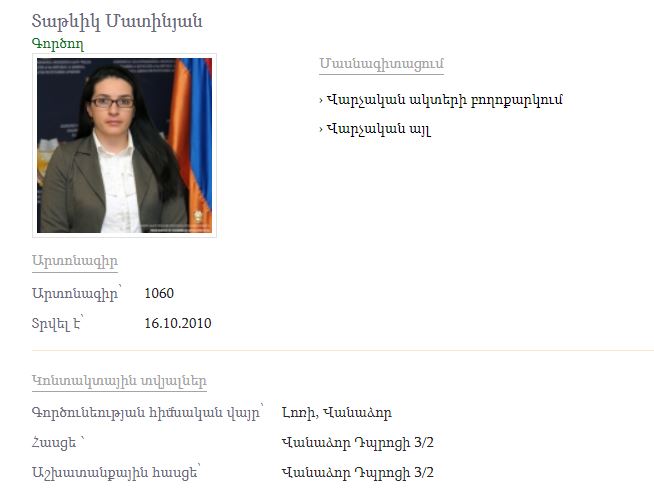
In addition, they have also worked together under the “Monitoring Justice” program and developed the report on the results of monitoring of the justice sector “Needs and Expectations of the Public”, published on 28 February, 2017. The main expert of the project was Haykuhi Harutyunyan, and Tatevik Matinyan was the expert. The project was implemented by a law firm founded by Taron Simonyan, a member of the “Bright Armenia” faction. (See page 2)
The names of Haykuhi Harutyunyan, Edmon Marukyan and Tatevik Matinyan also appear in the same place in the statement of Lori Marz Attorneys v. Lori Marz Prosecutor dated 25 March, 2011 , which was published on the official website of the Chamber of Advocates on 26 March of the same year.
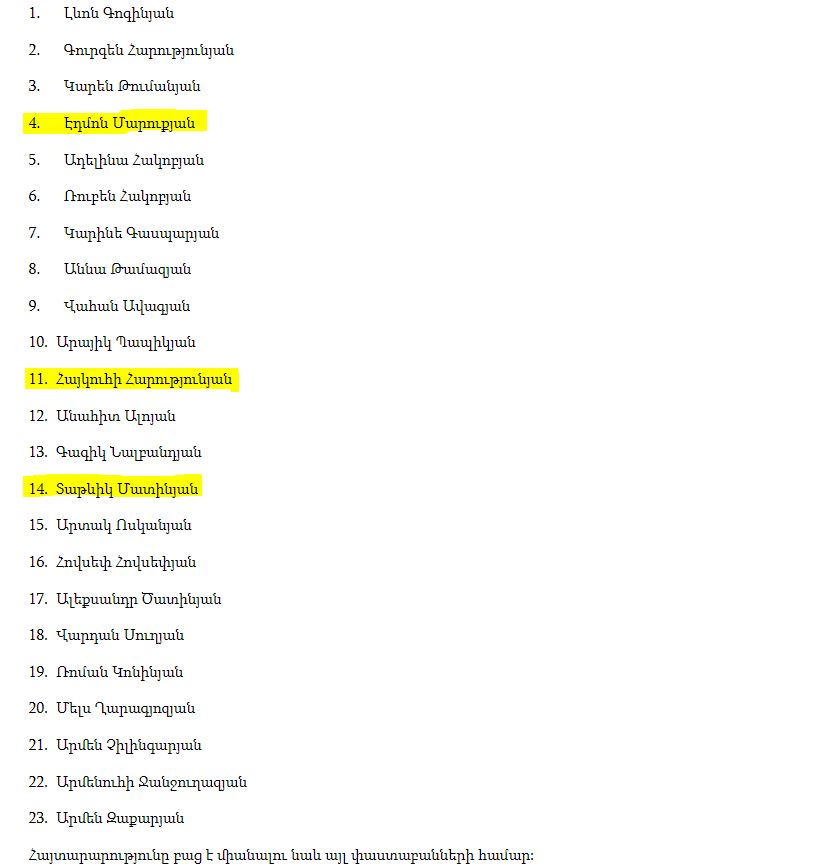
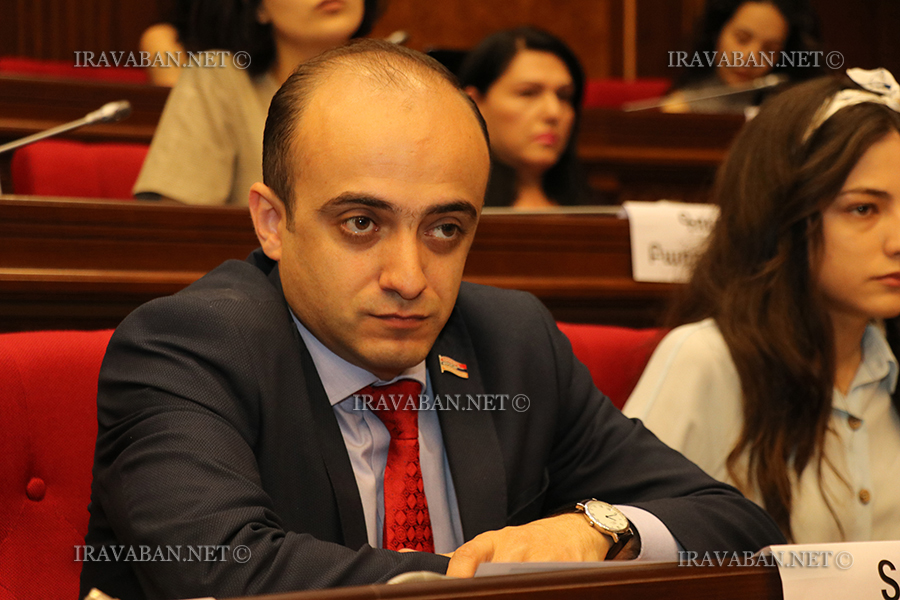
It should also be noted that Edmon Marukyan’s wife, Tatevik Matinyan, the data coordinator of the site, is currently working at the “ELL Partnership” Law Firm founded by Taron Simonyan, a member of the National Assembly of Armenia.
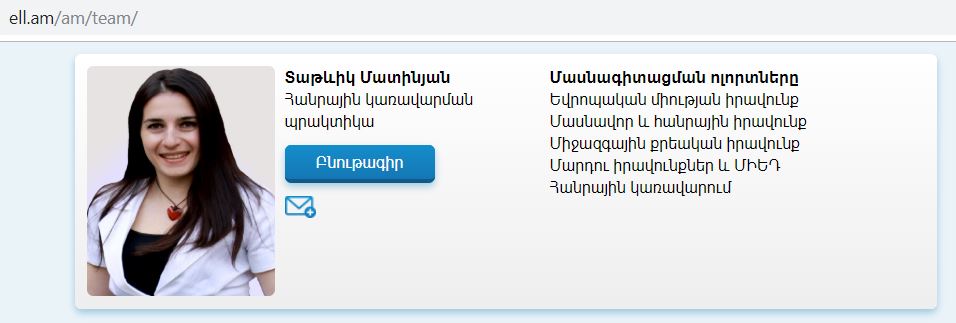
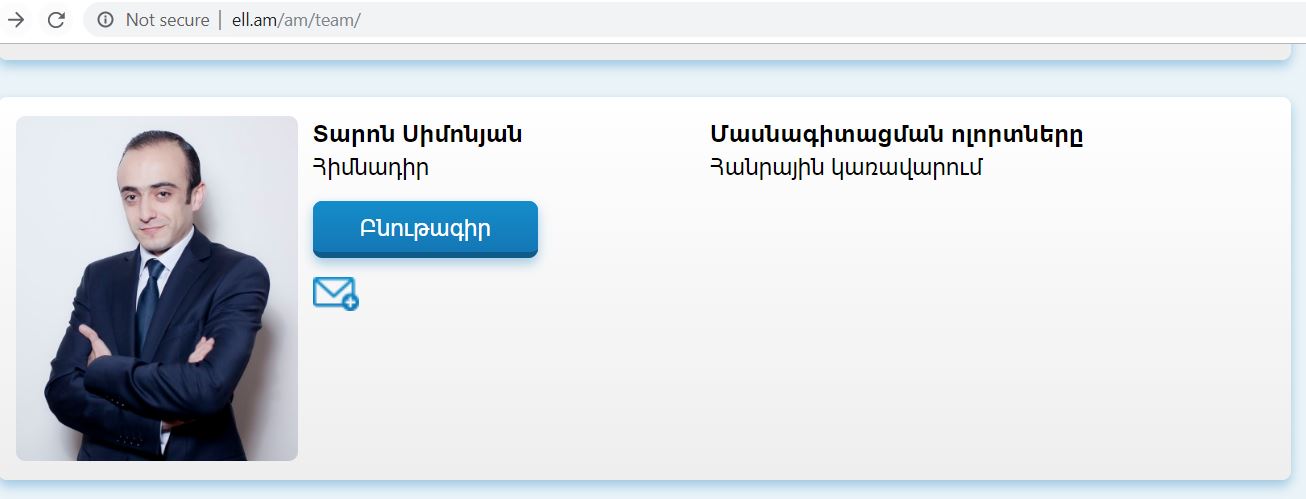
According to Haykuhi Harutyunyan’s work record card, she worked for the Helsinki Citizens’ Assembly-Vanadzor Office (HCAV), President Arthur Sakunts, from 1 October, 2004 till 20 May 2011with a few days intervals.
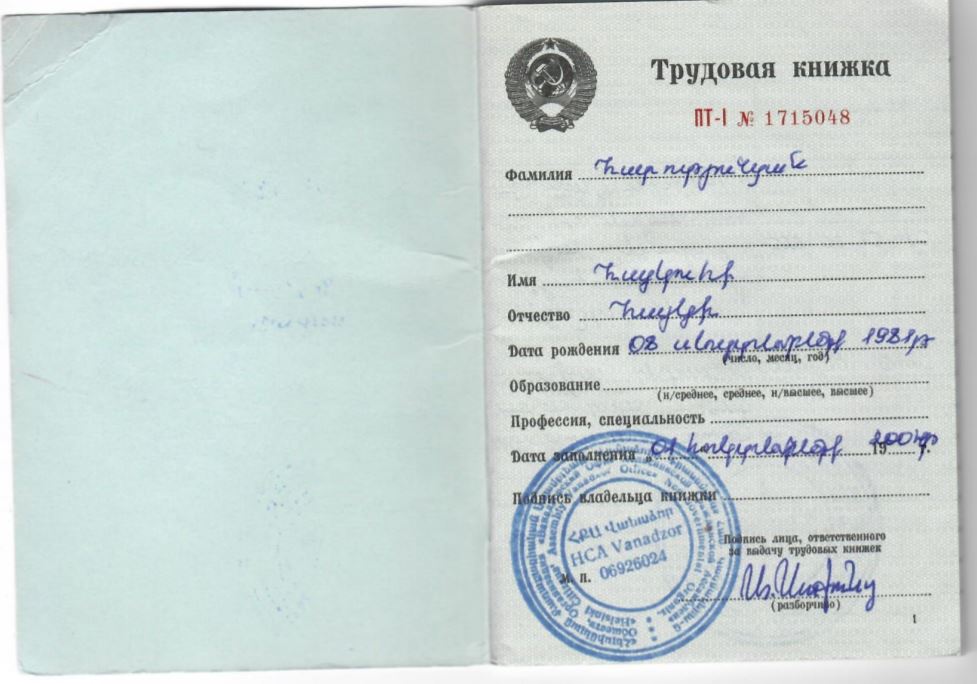
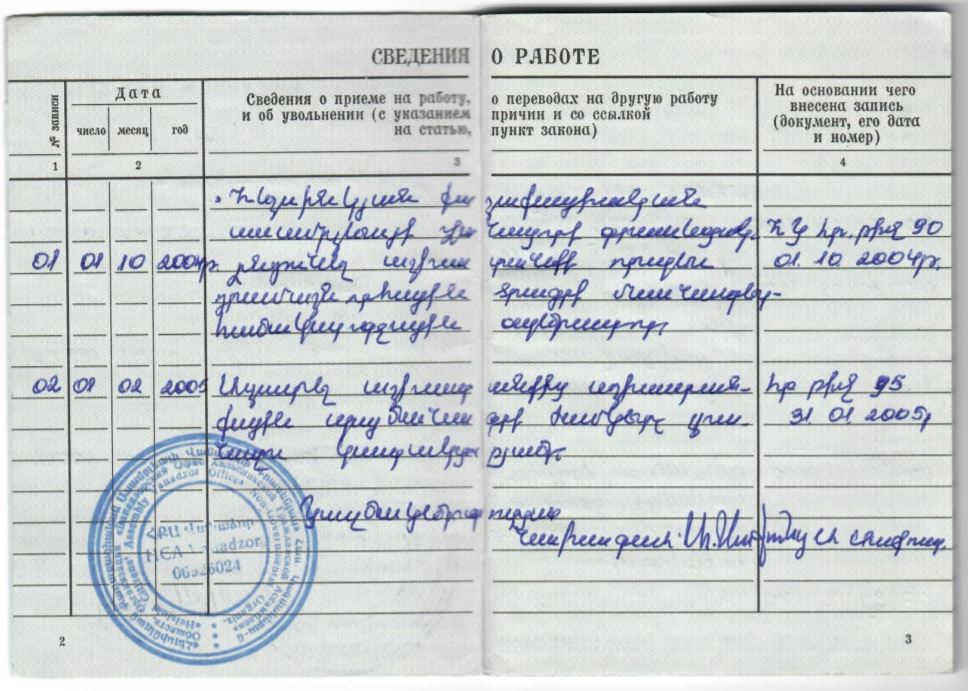
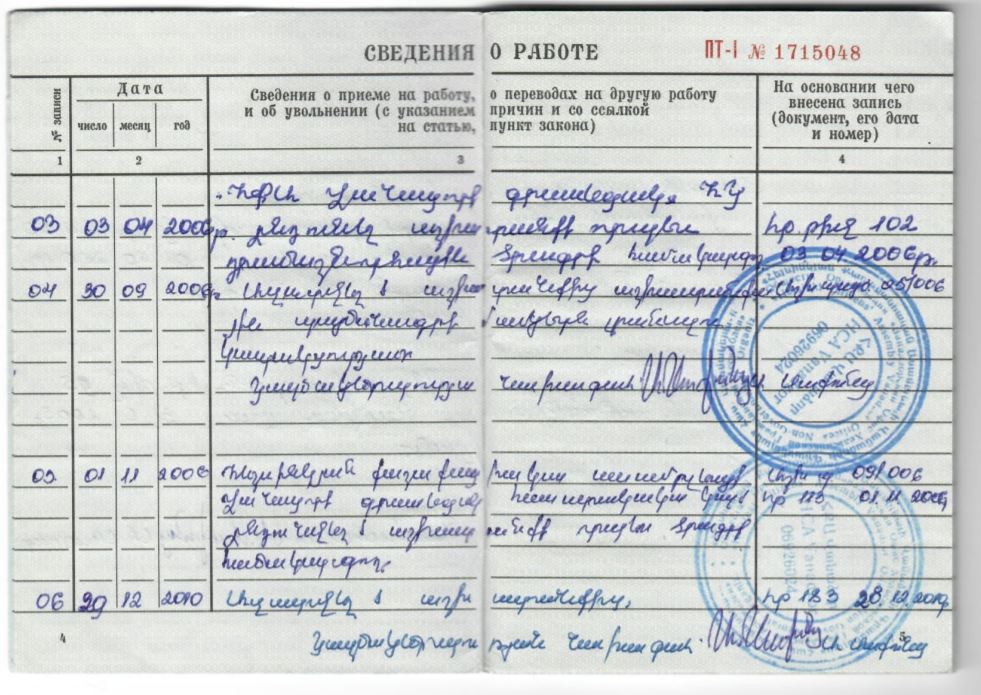
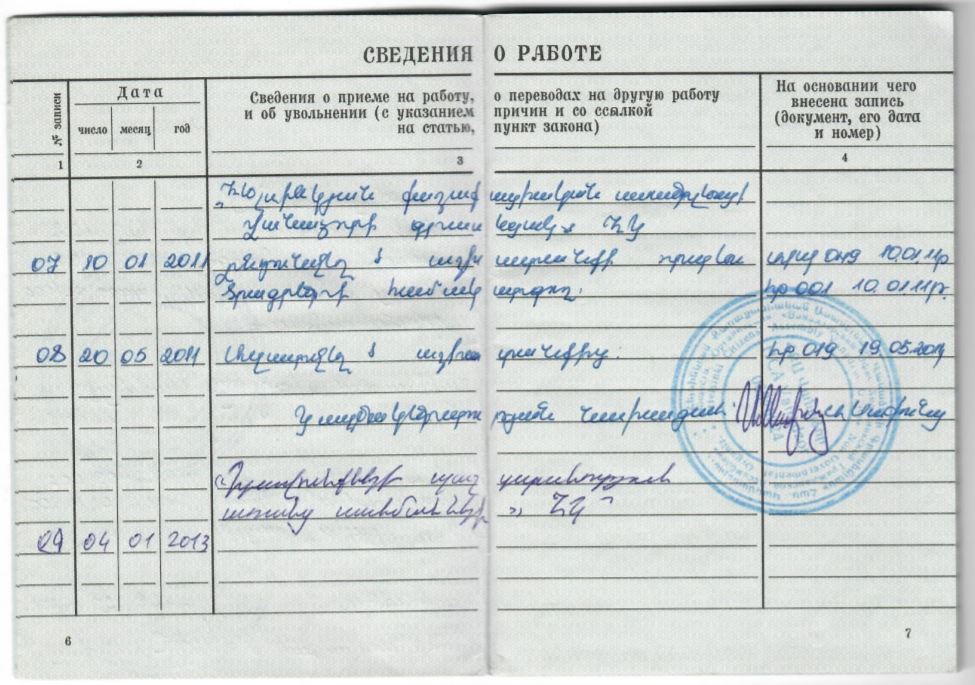
Since 4 January, 2013, Haykuhi Harutyunyan has been working at “Protection of Rights Without Borders” NGO.
Haykuhi Harutyunyan’s relationship with Siranush Sahakyan, the Former President of the Commission on Ethics of High-Ranking Officials of Armenia
“You have assumed the position of the President of the “Protection of Rights without Borders” NGO, previously occupied by Siranuysh Sahakyan, Serzh Sargsyan’s referent, appointed in 2013, (from April 4, 2013 to December 30, 2013, – author ) who later became Chairman of the Commission on Ethics of High-Ranking Officials of Armenia (was appointed on , January, 2014, author). I would like to know the affiliation you have with Siranush Sahakyan. And I have no doubt about your sincerity in the fight against corruption and so on, for example, have you faced any difficulty or discomfort within the organization headed by Siranush Sahakyan?”
It should be noted that Siranush Sahakyan was the founding president of the “Protection of Rights without Borders” NGO, and was its the President from 2009-2013.
In response to the MP’s question Haykuhi Harutyunyan said it was not a secret; “We have and have been in a friendly relationship, but I believe that since 2013, no one in the activities of the organization will be able to point out or show any evidence that we have had any impact. In our work, the sharp, willful criticism of the former authorities has never been restrained. I have not received any restraint personally.”
It should be noted that Siranush Sahakyan gave an interview to Tert.am where she noted; “The election and nomination of members for this commission – tasked with corruption prevention affairs – bears strictly a political nature. And members of the ruling political force too, raised the issue recently, insisting on the political consensus underlying this process. So my concern deals with the fact that the corruption prevention commission is institutionally formed through a political consensus. If there is a political consensus, personalities do not matter at all, because regardless of the chairperson. The members elected through a consensus represent the political forces, and so the decisions too, will be adopted through the [political] force having a dominant presence.” Agreeing that the National Assembly was granted the dominant role in the election of the comission members, Sahakyan noted that it did not name a “united candidate” ahead of the parliament voting. “We are again reaffirming the fact that those candidates [nominated by the parliament factions] appeared on the arena through political arrangements and bargaining,”
This link, as well as the above-mentioned interview, shows that the CEC members were nominated and elected as a result of political arrangements, thereby giving the Commission a highly political flavor.
Personal Motives and Open Society Foundations – Armenia (which is know among the public as George Soros Foundation) link with the Process
Pursuant to Article 8 of the Law on the Corruption Prevention Committee, the Committee maintains political neutrality in the exercise of its powers.
In October 2018, report on the fourth round on Armenia in the framework of the Organization for Economic Co-operation and Development (OECD) Istanbul Anti-Corruption Action was published. Recommendation 3 of the report states: “Ensure transparency and objectivity of the appointment of Commissioners, free from any, including political interference and that the process is seen as objective by the public at large.”
In the light of the aforesaid, there may be reasonable doubts as to the political neutrality of the Committee. Moreover, indirectly, the mentioned regulation and the recommendation of the professional body suggest that the members of the committee should also be neutral and have no personal interest in the process.
Previously, Article 11 of the Law on the Corruption Prevention Committee, which lapsed on 13 September, 2019 (HO-180-N), provided :
«1. The President of the National Assembly shall set up a Competition Board (hereinafter referred to as the Board) for the election of candidates for the position of Committee Member.
2. The Board shall consist of one member appointed by the President of the Constitutional Court, the Human Rights Defender, the opposition factions of the National Assembly, the Public Council and the Chamber of Advocates. The member of the Board nominated by the opposition parties shall be appointed by consensus (consensus) from the opposition factions of the National Assembly.”
In the interview with Iravaban.net Haykuhi Harutyunyan, the Chair of the CPC, mentioned that she was the president of a non-governmental organization during the mentioned period and had made a public statement about it.
“If you look at the next report of the Organization for Economic Co-operation and Development (OECD), you will see that there is also a reference about us that we, as an organization, have expressed some concerns about the organizational form merely. That is to say, there was a Competition Board in place, I can clearly remember at the moment about the timing and the awareness, and also participation of each institution: how each institution had informed and what participatory opportunities it had ensured. We had concerns at the time that the process was more limited in terms of participation, in relation to the nomination of the Chamber of Advocates and other bodies. Please distinguish the procedural part from its contextual functions. And there was a recommendation on repetition of the process in order to have possibility to provide a larger format of participation, but then it did not work out. In other words, it was not possible to form the commission again” Haykuhi Harutyunyan said.
According to her, in the procedural aspect, such format of participatory and professional representation was not acceptable for the formation of the Competition Board. “For example, there was an opportunity for NGOs to participate, and that participation should be ensured in the face of the Public Council, which we really disagreed with. There was a reservation about the version presented by the Chamber of Advocates because the deadlines and notification were very limited and not everyone was able to participate. That is to say, even from the point of view of this organizational process it was problematic for us, and subsequent discussions simply changed the formation procedure in terms of forming a Competition Board or assigning powers, and authorities to other bodies and persons.”
The report of the Organization for Economic Co-operation and Development (OECD) states:
The selection of the Competition Board members has started but is not finalised as of June 2018. The monitoring team was troubled to learn about the controversies going on around the setting up of the agency and the process of the selection of the members of the Competition Board. A group of NGOs has expressed concerns with regard to the process of nomination and selection of the members of the Competition Board, and that the selected members are not perceived to be suitable to assess the competencies of the candidates.
Anti-Corruption Coalition of Armenia however praised the selection process as being open and transparent. ”
It is perhaps noteworthy that Haykuhi Harutyunyan had a personal interest in 2018, when after the revolution she tried to coordinate a group of NGOs by e-mail, raising concerns about Mariam Zadoyan, a member nominated by the Chamber of Advocates as a candidate .
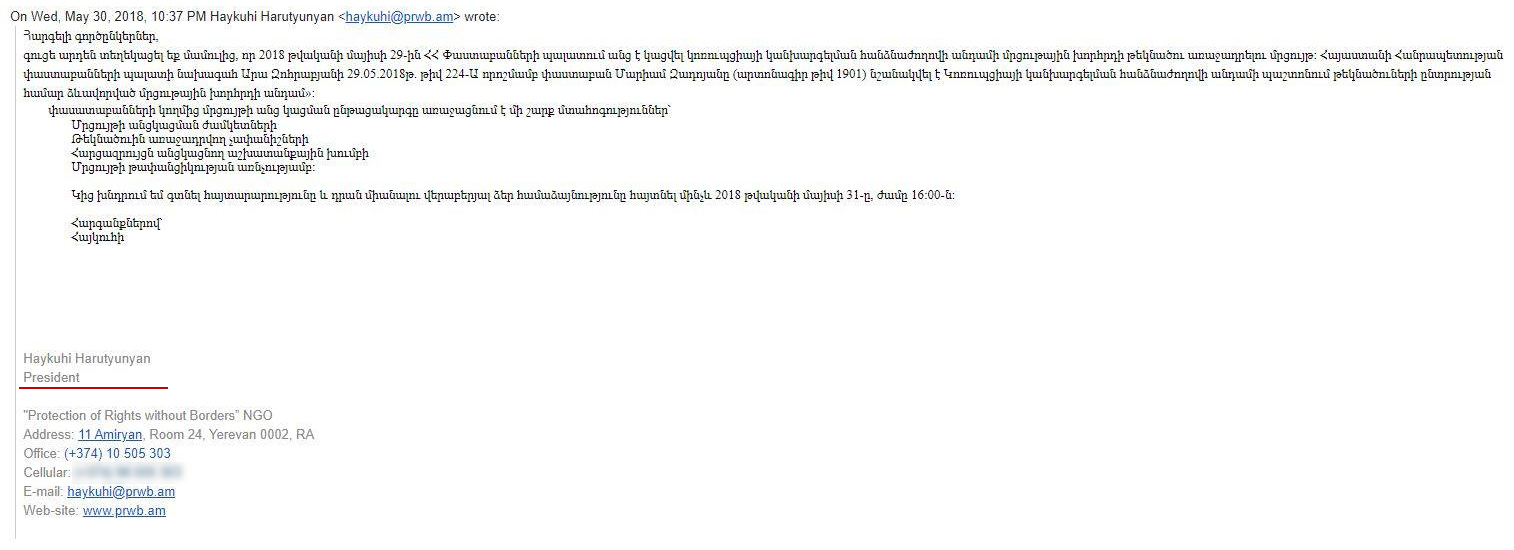
The logical continuation of the email was a public statement.
We, the undersigned non-governmental organizations are expressing our concern on the information published on the official webpage of the RA Chamber of Advocates on May 29 of 2018, according to which “On May 29 of 2018, a competition on the selection of a candidate for the council, according to which “By the decision N 224-A of 29.05.2018, adopted by Ara Zohranyan, the President of the Chamber of Advocates, advocate Mariam Zadoyan (license number 1901) was appointed as a member of the council for the selection of the members of the Corruption Prevention Commission,” the statement read.
It is also important to note that the signatories of the above-mentioned statement have been financed or are funded from one source at different times: by the Open Society Foundations – Armenia (which is know among the public as George Soros Foundation).
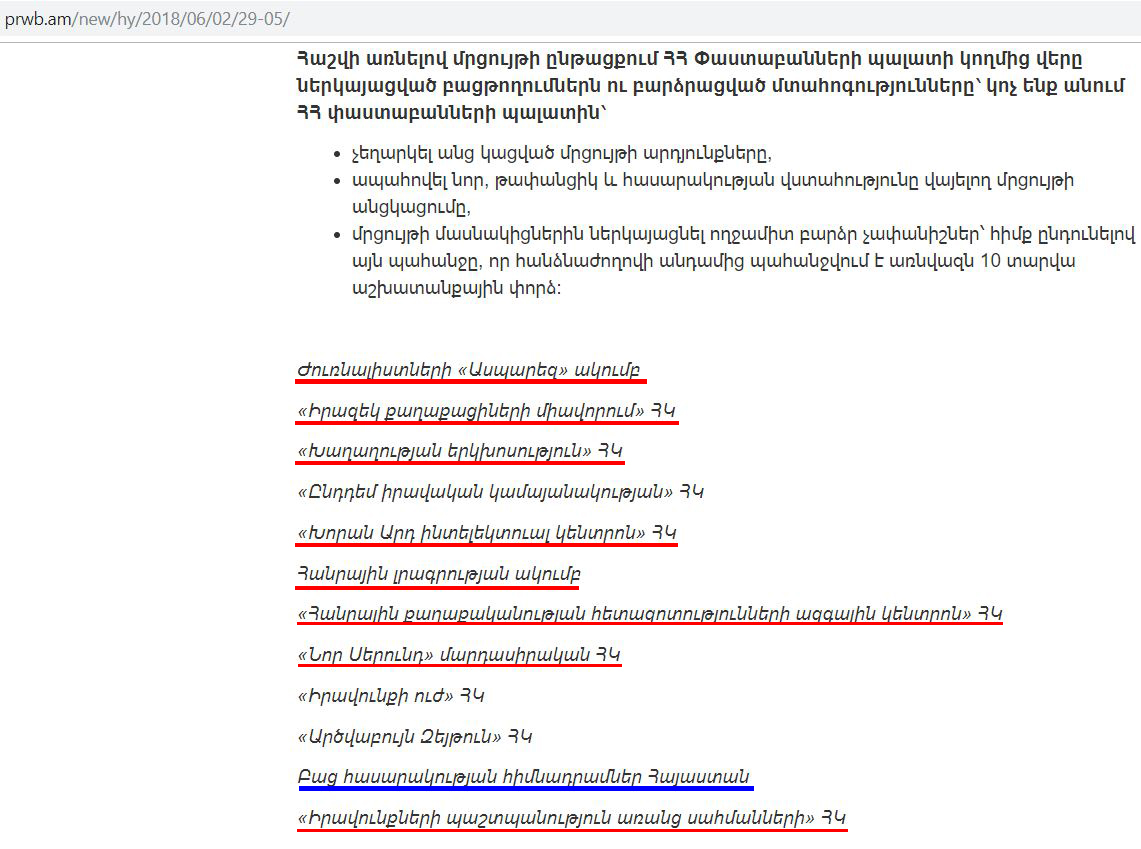
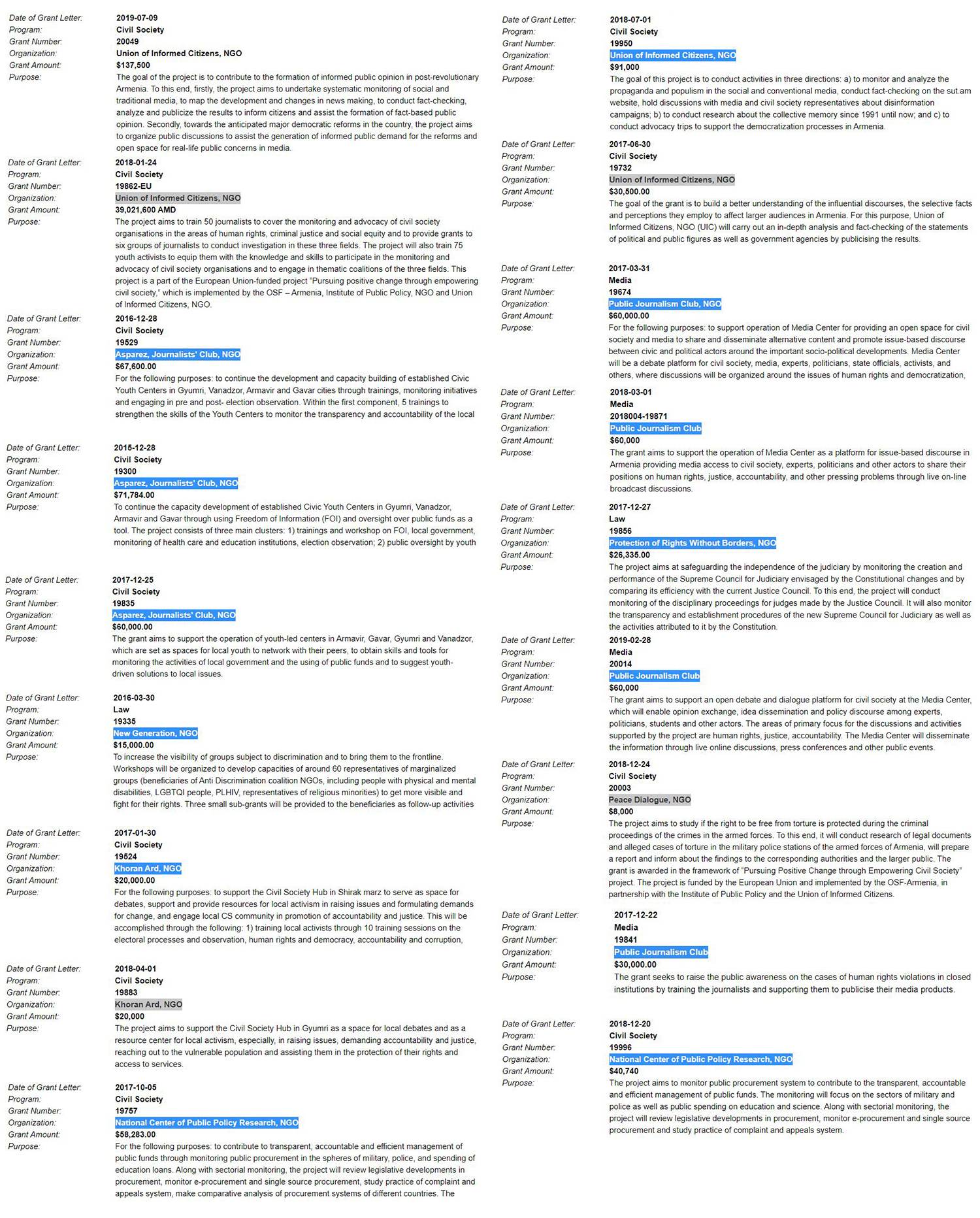
In response to our question whether his statement that had been published was made by her, Haykuhi Harutyunyan replied negatively: “No, open the website of the organization; it says what the problem is. Other NGOs have joined the statement as well and the OECD has used that part to some extent,” she said.
The statement was also followed by a statement by the CSO Anti-Corruption Coalition of Armenia, saying that “The Anti-Corruption Coalition welcomes the open competition, organized by the RA Chamber of Advocates on May 29, to select a candidate, despite the fact that the RA Law on Prevention of Corruption does not stipulate a compulsory tender.”And the President of the Constitutional Court, the Human Rights Defender, opposition factions of the National Assembly and the Public Council were urged to select their candidates for the competition board in an open and transparent manner, taking into account their involvement and experience in the field of anti-corruption.
It should be noted that the Chamber of Advocates announced about the competition on 21 May, 2018. Six out of 8 candidates that had applied came for the interview.
The working group that conducted interviews (Emil Amirkhanyan, Mane Karapetyan and Tsovinar Khachatryan) summarized the results of the interviews and nominated Mariam Zadoyan as a candidate for the member of the Competition board and submitted it to the President of the RA Chamber of Advocates for approval.
Iravaban.net hasalready touched on the legitimacy of the formation of the CPC Competition Board.
Return of the Competition Board Law on the Commission on Prevention of Corruption
On 21 November, the 49th issue on the agenda of the regular session the Government (In approval of the package of the Draft Laws On Making Amendments and Additions to the Constitutional Law of the Republic of Armenia Judicial Code, On the Constitutional Laws and Related Laws of the Republic of Armenia On Making Amendments and Additions to the Constitutional Law of the Republic of Armenia) also included regulations on the return of the Competition Board to the Corruption Prevention Commission. The executive has adopted the decision to make changes.
The draft states that Article 9 of the Law on Corruption Prevention Committee, the Procedure for the Formation of the Commission, shall be amended to read as follows:
“The Board shall be composed of one member appointed by the Government, one by the National Assembly, one by the Supreme Judicial Council, one by the Human Rights Defender and one by the Chamber of Advocates. The President of the National Assembly shall apply to the Government, the National Assembly, the Supreme Judicial Council, the Human Rights Defender and the Chamber of Advocates to nominate one candidate by each within the period of ten days, to be included in the Competition Board.” This means, that the Competition Board is brought back.
As for the package of these changes, Haykuhi Harutyunyan noted: “Not only in terms of competition, but there are also some issues that are directly relevant to our work at this time, but since the commission in our person, was formed later, than those drafts were elaborated, circulated and debated, and we had no opportunity to present our opinion in some way. Currently we are working specifically on presenting our position on a number of proposals officially, including amendments to the Law on Public Service and other decisions resulting thereof, and soon all these will be presented.”
The question arises, why or for whom the Competition Board was removed, the first staff of the CPC was elected, and then the necessity of having a Competition Board again arose.
P.S.
Currently, Iravaban.net is conducting another investigation related to the Competition Board of the Corruption Prevention Committee, which will reveal who overthrew it.
Alisa Chilingaryan


